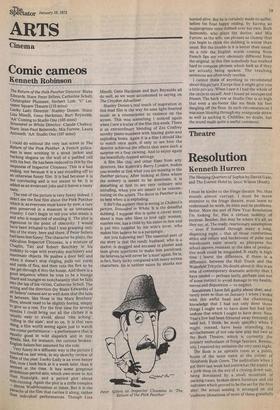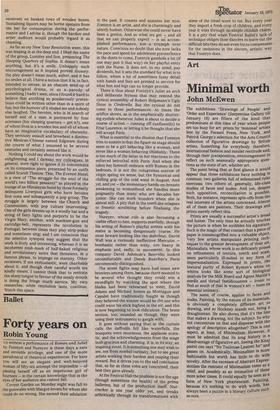Theatre
Resolution
Kenneth Hurren
The Sleeping Quarters of Sophia by David Gale, and The Everest Hotel by Snoo Wilson (Bush) I must be kinder to the fringe theatre. No, that sounds almost corrupt. I must be more attentive to the fringe theatre, must learn to understand its work, its aims and its problems. Better. More the sort of New Year Resolution I'm looking for. Has a certain nobility of purpose. Besides, this may be where it's all, as they say, at. The ready, reactionary assumption — even if fostered through many a long, dispiriting night — that all those comfortless attics and cellars and backrooms of pubs and warehouses exist mostly as playpens for school-leavers resistant to the idea of productive work could be misguided. It really is high time I learnt the difference, if there is a difference, between the Hull Truck and the Wakefield Tricycle. No doubt about it: this is an area of contemporary dramatic activity that I have tended — perhaps lazily, perhaps just out of some instinct to avoid damage to my health, nerves and disposition — to neglect.
Sometimes 1 have felt guilty about that; and rarely more so than on January 1 when I woke with this awful head and the chastening knowledge that I had not only done those things I ought not to have done but had left undone that which I ought to have done. New Year's Eve had been frittered away riotously (I need not, I think, be more specific) when I might, instead, have been attending the accouchement pf not one new play but two at the Bush Theatre, which is currently the primary enthusiasm of fringe fanciers. Resolutely, I repaired my omission the very next night, The Bush is an upstairs room in a public house of the same name at the corner of Shepherds Bush Green. The auditorium when got there last week had somewhat the aspect of a junk-shop on the eve of a closing-down sale, being dominated by a small mountain of packing-cases, broken-down furniture and old suitcases which proved to be the set for the first play; the actual seating is arranged on old 'cushions (donations of more of these gratefully received) on banked rows of wooden boxes. Sustaining liquors may be borne upstairs from the bar for consumption during the performance and I advise it, though the hardier and artier auditors would probably regard it as cheating.
As far as my New Year Resolution went, this was leaping in at the deep end. I liked the name of the group, Lumiere and Son, presenting The Sleeping Quarters of Sophia. It doesn't mean anything, but it's a smile. Unhappily such encouragement as it implied proved illusory: the play doesn't mean much, either, and it has no smiles at all. I have a notion that it is, in fact, intended to amuse, as an obscure send-up of psychological drama, or as a parody of something I hadn't seen, since I found it hard to believe that anything so ponderously pretentious could be written other than in a spirit of fun; but the humour of it eluded me and nobody else laughed. The heroine, who is in search of herself and of a man is portrayed by four actresses (her sleeping quarters — get it?), one of whom lives in a wooden box and all of whom have an imaginative vocabulary of obscenity. They seriously assault and browbeat a diminutive Mexican-Chinese named Edgware during the course of what I assumed to be several centuries and certainly seemed like it.
Nothing I could say about the work would be enlightening and I daresay my colleagues, in general, were right to ignore it to concentrate on its companion piece, presented by an outfit called Scarab Theatre. This, The Everest Hotel, is a view of "The struggle for the soul of the world's two billion peasants" as played in the lounge of an Himalayan hotel by three formerly delinquent Liverpool girls who have become first nuns and subsequently a pop group. The struggle is largely between the Church and Communism, with pop culture intervening. One of the girls dresses up in a woolly hat and a string of fairy lights and purports to be the Virgin Mary; another, with machine-gun and cartridge-belt, represents the revolution in Portugal; between times they play strip-poker and sometimes sing; and I am conscious that the selective synopsis may suggest that the work is lively and interesting, whereas it is an incoherent mish-mash of half-baked religious and revolutionary satire that threatens, in a famous phrase, to impinge on eternity. Other reviewers, if not enthusiastic, were charitable about it, and though their careful words are kindly meant, I cannot think that to restrain the sharp tongue in favour of the mealy mouth is doing the fringe much service. My own researches, while resolution lasts, continue. Watch this space.



























 Previous page
Previous page